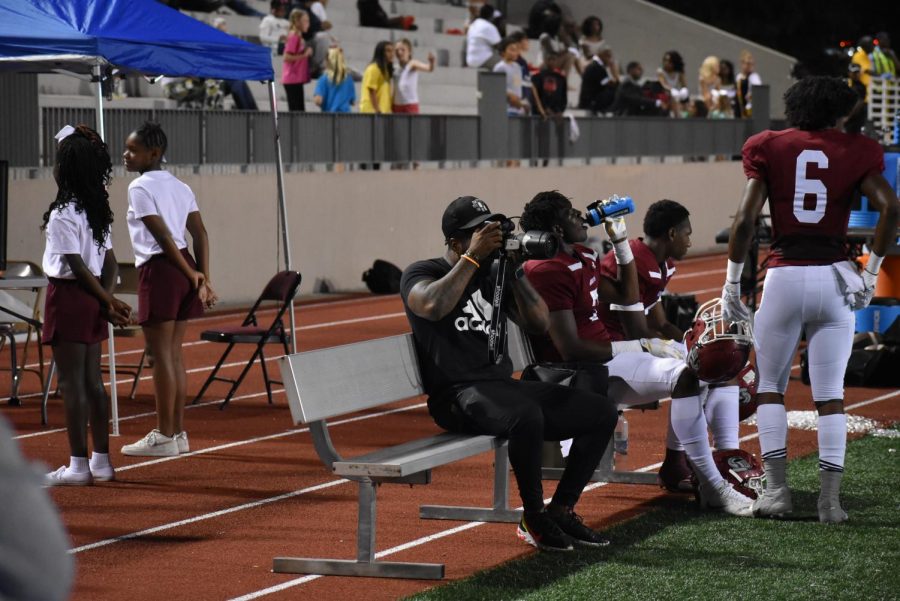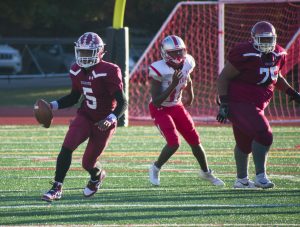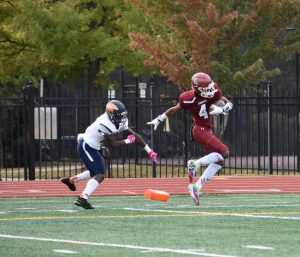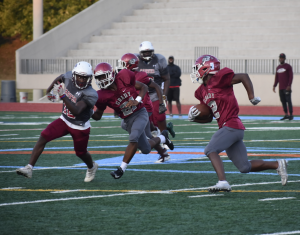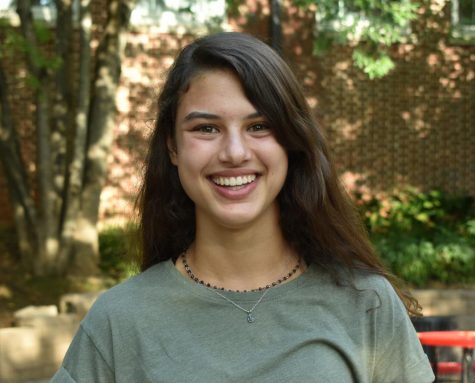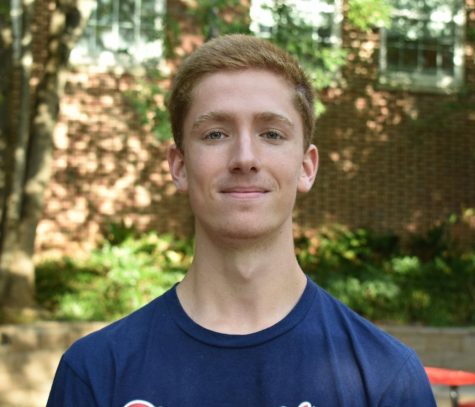Former quarterback Kelley recalls undefeated 2005 season that set Knights on winning course
Former Grady quarterback Simeon Kelley (left) focuses the camera on the action from the bench as senior tight end Dewan Wright (center) squeezes a swig of water and current quarterback and senior Aquinas Stillwell (right) takes a breather. Kelley, now a photographer for Atlanta Public Schools, led the Knights to an undefeated regular season and state semifinals finish in 2005.
October 23, 2019
Rewind it back. The year is 2004. The Knights’ football team is set to face Putnam County in the first round of the State AA playoffs. After 51 years without a playoff win, the Knights finally win against Putnam County 27-26.
“My first year starting [was] my sophomore year. My class, we went, and we beat Putnam County, and that was a country team, and the biggest thing that everybody says is city teams can’t beat country teams,” former Grady and former Ball State University quarterback Simeon Kelley said. “We won on a last-quarter drive with about 30 seconds left, and the crowd went crazy, and we went and lost to Calhoun in the second round. They beat [us], but everybody was just like, ‘that Grady team is going to be something special.’”
Kelley and his teammates from the Class of 2007 shattered records and impacted the Grady football program for years to come.
“Simeon and his class, I think his class was the winningest class in the history of Grady High School,” former head coach Ronnie Millen said.
Community backs Knights
The next year the team was set to face Calhoun again in the State Semifinal at the Georgia Dome and two wins away from a state championship. The Knights were 10-0, undefeated in the regular season, and were 3-0 to that point in the state playoffs.
“We won the first round of the playoffs [against Rockmart] and the second round against Laney High School,” said Kelley, who now does sports photography for Atlanta Public Schools and shot Grady’s first game this season against rival North Atlanta. “That second round was supposed to be a close game, a really close game, and it was. We won 13-7, and the team that we played was pretty much a mirror image of our team. [The Knights beat Macon County 20-0 in the third round.] Then we went and played Calhoun, and it was a good game in the beginning, but then we lost. It was so amazing seeing the entire city behind us.”
Despite the loss to Calhoun in the semifinal, 2005 was a big year for the Knights, not just in terms of play, but in bringing together the school and the community.
“A lot of the folks that were coming to the game were just not Grady people, it was just people in the city who wanted to see good football were also coming to the games,” Millen said. “Matter of fact, during that 2005 season, it was just amazing to see the classes from the 50s coming back with their jackets on. Alumni, I mean we actually had a guy drive from Michigan to come to a Grady football game that was in the class of 1950-something. And they were wearing their jackets, and they also were part of it, they actually donated money to the weight room, so when we had our first weight room over there, they raised money and donated to that. We had all that support from alumni, from the community, from the businesses.”
Kelley agrees.
“After our sophomore year, the Grady community was so amazing from the standpoint of [equality] from the hood to the privileged,” Kelley said. “We were all one. You had everybody always together. It was just no division, and everybody was focused on bringing that Grady pride, bringing that city pride back.”
Millen cited the “great group of guys” on his team and a “great coaching staff and great parents” as main factors in the community involvement in the early 2000s. In addition, teachers would adopt a football player every week to support him for each game.
At the time of the historic football seasons, Grady did not have a full-sized weight room for the team to use. However, many of the “country” schools and private schools that the Knights played against had much larger coaching staffs and abundant resources. The lack of funding led to an improved mindset on the team, says Millen.
“I’ll tell you this, a lot of those schools have much better resources,” Millen said. “They have more coaches. We didn’t have the turf field. The weight room was where the robotics room was at that time, so a lot of our weight lifting was done in the parking lot, but we were able to overcome all of that by just doing extra hard work. I realized that we had to do double what those other schools were doing on the outside. But when you had to play schools like St. Pius, and some of those schools, they have 20 coaches.”
Millen said city schools like Grady are at an obvious disadvantage.
“So, the field is not level when it comes to schools in APS and some of those big powerhouse schools,” Millen said. “They may have their offensive team in a first-period class with the coach. So, they’re doing things during the day. So, I’m sure [current head coach Kevin Clark] does not have that same advantage. I think they’re doing an outstanding job with what they have to work with, so just give them some time, I think he’s gonna turn it around.”
Fast forward to now. The year is 2019. The Knights, currently 3-4 and 2-2 in Region 6-AAAAA, are uncertain of a playoff run. Last year, they were 1-9. The Grady football team has had trouble in the playoffs since 2005, with just a few deep playoff runs in 2006 and 2011 to the third round with losses to Shaw and Peach County. In 2015 and 2016, the team advanced to the second round, losing to Thomson in 2015 and Woodland-Stockbridge in 2016. However, the Knights have not advanced as far as the state semifinal since 2005, despite well-versed players who have come to play at the school.
Success made program stronger
“What I can say is, before my class got there, we were building a culture and what ended up happening was with our success came more offers (football scholarships) and more visibility for Grady,” Kelley said. “From that, then we got Damian Swann (former New Orleans Saints and University of Georgia player), Grady High School’s first All-American, the Newton family (Caylin Newton, Class of 2017, younger brother of Cam Newton of the Carolina Panthers), so we started to get more high-profile players. Yeah, they didn’t go as far as we did, but we started to get more high-profile players.”
Kelley also pointed out that not all talented players work to maximize their ability and that lack of work ethic can sometimes hurt a program.
“Now, the issue with that becomes with more notoriety for these players, some of them don’t have the work ethic,” Kelley said. “Football is a little bit more of a gladiator sport, and you just have to put in a different work ethic to be great in that sport. For football, you have to make sure you are in the weight room, getting stronger. I know for a fact some of the kids playing on the team are more worried about ‘hey let me go to Mellow Mushroom, let me go to get something to eat, let me go to Bruster’s, let me go hang out with my girlfriend,’ where for us, it was immediately after school we had study hall and that was with your teammates. Coach Millen actually made us do work, which was crazy cause other schools didn’t. Then from there, we had mandatory film study. He ran it almost like a college. We had to spend time with each other, and then we had practice. It was less excuses and more doing as a team. The more notoriety that we brought to the school, it created more individualism for a lot of the players.”
Because of coaches being let go by the district and other “unforeseen issues,” according to Kelley, the football program is currently in a rebuilding phase.
“They are getting back into building a culture because what happened was, we built the culture,” Kelley said. “[The problems] kind of crumbled the foundation, so now they are rebuilding that foundation. My advice is to continue to build that foundation because the last two years after Caylin Newton left, Grady [struggled]. But this season, it is actually ten thousand times better, and for me, being optimistic is key. I am a glass half-full type of person: when you tell me that we are starting to win, then I am like, ‘okay we are heading down the right path,’ because once you start to win, then younger players from middle school start to see ‘man I see some actual ball players at Grady, I can go there this fall.’”
When Millen was coaching, he emphasized the importance of academics to his team by holding mandatory study halls for them before practice and ACT preparation classes on the weekends.
“We instilled hard work, and academics was important, you know, our kids had to go to study hall,” Millen said. “We had study hall and things like that prior to practice, so it was important that they be students first. Clark also requires the current players to attend a study hall.
Despite the team’s current rebuilding, the most important thing is that Grady’s academics continue to stand out, Kelley says.
“Because once again, regardless, what we do know is Grady can go 0-10, but the foundation of the school has never left,” Kelley said. “We still have the highest test scores out of any other Atlanta Public School, and no one can compete with that. So, mostly all of our students will go on to be successful is some fashion of their life. That is one thing that has been laid for over 60-70 years, it is just building that back up with football, so that is my advice: continue to build a foundation for the football team and just stay focused.”

